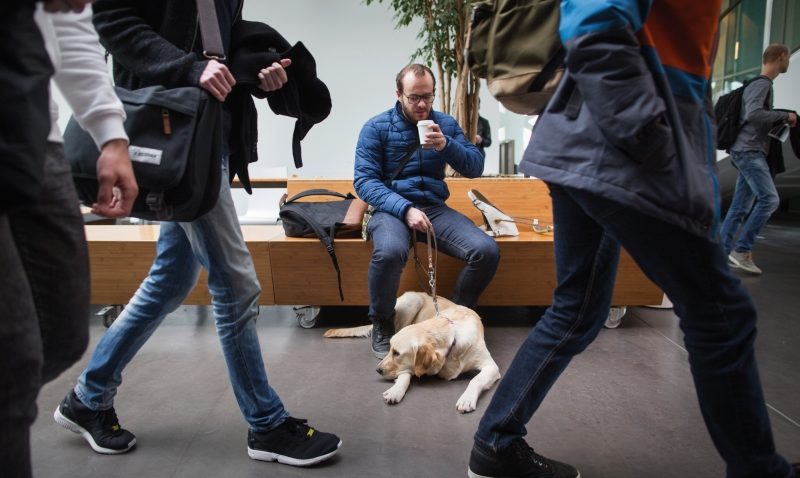Usher-patient Jorrit won’t let himself be put off
Student Jorrit Overweg is hard hearing and partially sighted. Still he has an optimistic outlook on live: “There are so many things I can do!”
“You have to imagine that every day I have to look through toilet rolls. I can clearly see things that are right in front of me, but everything around that I cannot,” tells Jorrit Overweg (25). The ICT student has Usher syndrome that can cause both sight and hearing impairments. “I find busy situations where a lot is happening at once around me difficult. For example, at the train station or the hallways at Windesheim. Then I run into people sometimes. One time I walked into a concrete pillar. That left me a big scar on my forehead.”
Best buddies
The Usher syndrome is genetic disease that impairs sight and hearing. The implications mostly get worse over time. In the Netherlands, six hundred to a thousand people have the Usher syndrome. There is no remedy yet, but there are tools available to make life easier.
Jorrit has a lot of support from Nigel, a guide dog who has been at his side since January. “A blind person’s cane helps, but you still need to lookout for yourself. With a guide dog, it is much easier. He walks around obstacles, so that I never run into things anymore.”
Jorrit is best buddies with his dog: “Nigel became part of the family. I give him a lot of care and love, because he works for me after all! Nigel is a real cuddle monster that loves physical contact and wholeheartedly wants to be with me.” That is the reason why the Labrador was chosen. “For example, a young, wild dog will not be matched with an elderly lady, because it is imported that you complement each other.” Thanks to Nigel, Jorrit’s days are less exhausting. “During a walk, you have to look around and focus on obstacles. That drained so much energy that I often was wrecked when I got home. As Nigel has taken over some of these tasks, I maintain my energy now! I can now enjoy a walk and or talk too. Because of Nigel I do a lot more at the same time.”
Ticking clock
Jorrit has a tool for his hearing as well: a cochlear hearing implant (CI), which is an external machine behind Jorrit’s ear and an implant that is surgically planted underneath the skin. The implant stimulates the acoustic nerve with electric pulses, which causes sounds Jorrit can perceive. He can converse just fine with someone in a quiet room. “It gets difficult when people are speaking at the same time or if there is background noise. I cannot make that distinction. Even a ticking clock bother me sometimes. If we are working in groups during class and it gets noisy, I don’t get all the information. But I do get what is being said rather quickly, even when I don’t hear everything.”
The CI can be wirelessly connect to other appliances, for example, a microphone the teacher hangs around his neck. “That way I can follow the lecture effortlessly. Or I connect it to my computer to listen to music or to watch a movie.”
Enjoyment
Korfball, go-karts, skiing: these are all things Jorrit loved to do in the past, but he can’t nowadays. How Jorrit’s disability will develop in the future is unpredictable. But it can only get worse. A depressing thought? “No. Of course I would love to do all those things again, but I don’t really feel disabled. There are so many things I can do and I enjoy that. For example, travelling and watching movies. I try to see things in a positive light. For example, I will never be able to drive a car, but then I just think: I never have to be the designated driver!”
Skipped
Jorrit wants to use his technical knowledge to help others with a disability. That’s why he came up with an idea for a new application for smartwatches. “It would come in handy when the watch would vibrate whenever the doorbell, alarm clock or phone rings. Those are inaudible when you’re deaf, but you would notice a small vibration.” The idea was picked up by students of the University of Applied Sciences in Amsterdam and they are developing it further.
Even though Jorrit gets a lot of sympathy at Windesheim, he notices that he gets a lot of misunderstanding outside of campus.
“When I applied for a job at a supermarket, I got turned down due to my disability. Even though I was more than capable! That made no sense. When you have a disability, you get skipped or written off by society. As if you can do nothing. But that is bullocks. Maybe we need a little bit of extra help, but we are just as functional as all the others.”
Jitse Schipper
